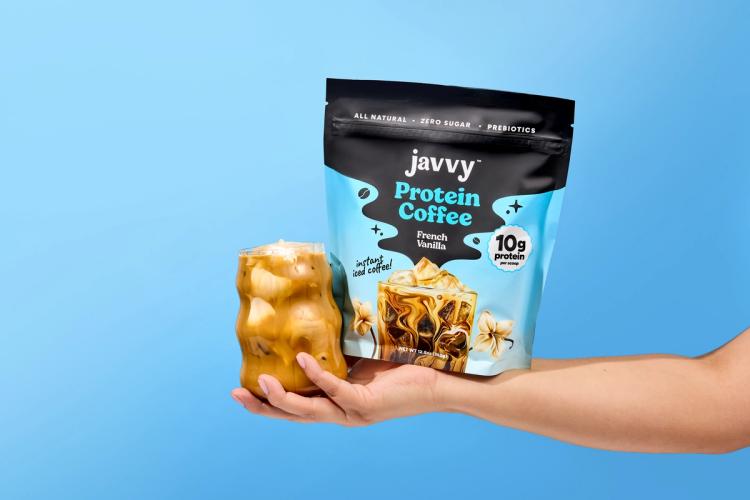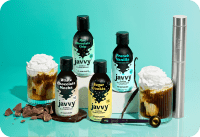
Homemade vs. Store-Bought Protein Coffee: Taste, Cost, & Nutrition Compared
Key Takeaways:
What Is Protein Coffee?

Protein coffee is brewed coffee mixed with an added protein source, such as whey, plant-based, or collagen protein powder. It delivers caffeine for energy and protein for satiety and muscle support in one drink.
It’s blown up over the last few years because it solves multiple morning problems at once: you get steady energy, better appetite control, convenient nutrition, and support for fitness or low-carb goals. The trend is only growing, with the global protein coffee market expected to jump from $4B in 2024 to $14.7B by 2034.
People reach for it because it helps them stay full, stay focused, and skip sugary breakfasts without losing flavor or convenience.
Taste Comparison: Homemade vs. Store-Bought Protein Coffee

The biggest difference you’ll notice between homemade and store-bought protein coffee is control versus consistency.
Homemade protein coffee gives you full control over flavor, sweetness, and thickness. You choose the protein powder, the level of sweetness, and whether you want a thick shake-like texture or something closer to a latte. It’s also easier to hide the “protein taste” or adjust the mouthfeel.
Store-bought protein coffee sometimes leans on added flavors and sweeteners to make the drink shelf-stable and consistent. That means it’s predictable, but sometimes a little sweeter, creamier, or slightly more artificial, depending on the formula.
With Javvy, you’re getting no added sugar thanks to natural sweeteners — but you can still choose from delicious flavors like Caramel and White Chocolate Mocha.
What’s in Your Protein Coffee?

Homemade protein coffee depends entirely on your protein powder, the amount you add, and whether you include sweeteners or milk. It can be extremely macro-friendly or more indulgent — you’re in control.
Store-bought protein coffee is pre-set. Many are high in protein, but they can also contain added sugars, preservatives, oils, or thickeners for taste and shelf life.
To keep it simple:
Regardless of type, protein coffee can help stabilize blood sugar, support muscle recovery, and help you feel fuller for longer.
Cost: Homemade vs. Store-Bought Protein Coffee
Cost is one of the clearest differences between the two.
For many busy professionals, the choice often comes down to whether saving time or saving money matters more on a given morning.
Convenience and Preparation Differences

Homemade protein coffee takes a bit of technique but gives you the best texture when done right. Store-bought protein coffee needs zero prep, so it’s the ideal option for commuting, traveling, or getting out the door fast.
If texture matters to you, homemade usually wins. If speed wins, store-bought is unbeatable.
How To Choose the Right Protein Coffee for Your Lifestyle
Choosing between homemade and store-bought comes down to four questions: What’s your schedule? What’s your budget? What’s your diet? What’s your taste preference?
Choose homemade if you want:
Choose store-bought if you want:
If you want a middle ground, Javvy offers clean protein coffees that mix in seconds, pair real Arabica coffee with premium whey, and skip the sugar and preservatives found in many ready-to-drink options. It’s fast, clean, and still customizable.
The Bottom Line
Whether you choose homemade or store-bought protein coffee depends on your goals, preferences, and schedule. For the perfect cup every time, reach for Javvy and get 10 grams of whey protein per serving and no added sugar.
FAQs
Which tastes better: homemade or store-bought protein coffee?
Homemade protein coffee usually wins for personalization — you can adjust sweetness, texture, and flavor until it’s perfect for you. Store-bought options are consistent and convenient, but the flavor can lean sweeter or slightly more artificial depending on the brand.
Is homemade protein coffee more affordable than store-bought?
Yes. Homemade protein coffee typically costs $1-2 per serving, while store-bought bottles or cans often land between $3-5. You’re paying for convenience, packaging, and ready-to-drink formulas with the store-bought versions.
What type of protein powder works best in coffee?
Whey and plant-based powders both work well. Whey tends to mix into a creamier, latte-like texture, while plant-based powders are the better fit for vegan, dairy-free, or clean-ingredient lifestyles.
Can protein coffee support weight loss or muscle gain?
Yes. Protein coffee can help with both by giving you a filling, high-protein drink that also delivers steady energy from caffeine.
How do I prevent clumping when mixing protein powder into coffee?
Mix the powder with a splash of milk or water first to create a smooth base, then slowly add your cooled coffee while whisking or using a frother. Heat your coffee after mixing for the best experience.
Sources:
Protein Coffee: Benefits and How To Make | Cleveland Clinic
☕ The Protein Coffee Paradox You Don't Wanna Miss | Aromatech
Protein Powder: The What, Why, & How To Choose | University Health Center








